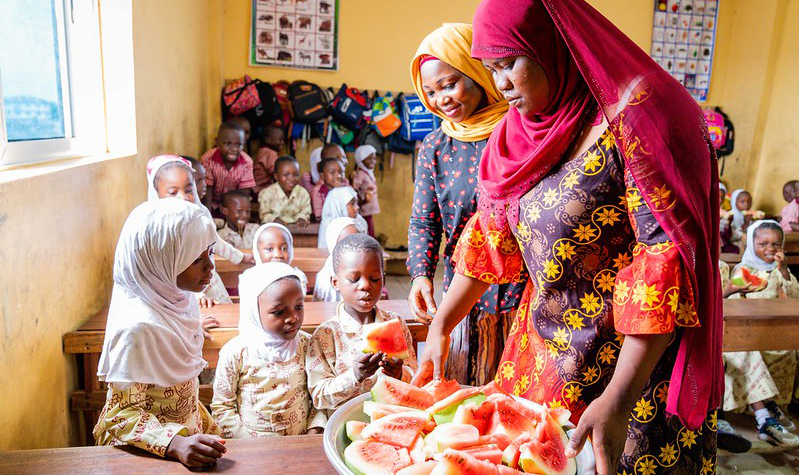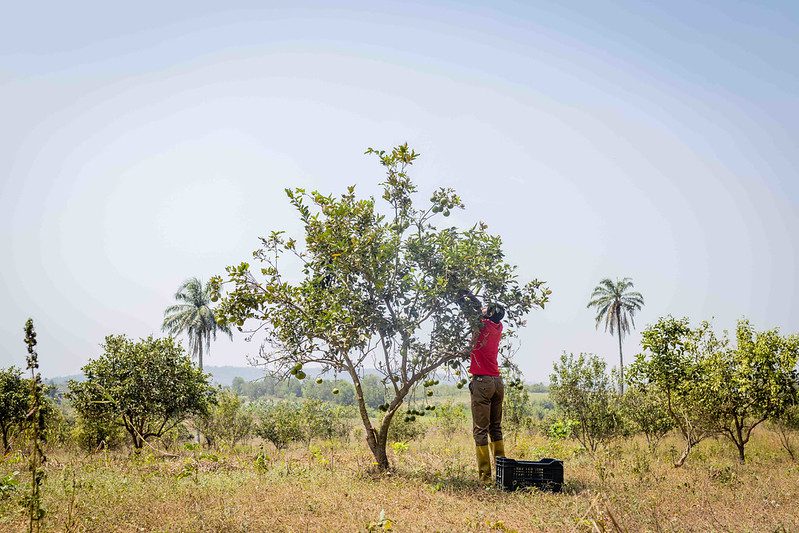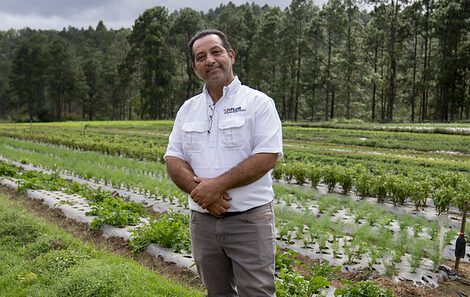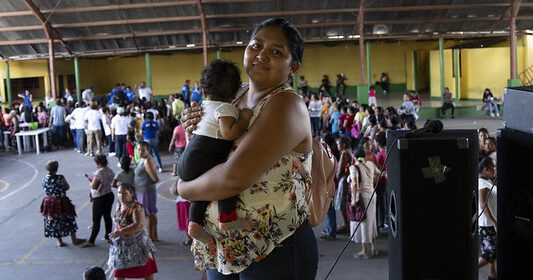
Em Ashaiman, Accra, Gana, Abubakari Barikisu, professor do Centro Ahlus Sunnah Wal Jama'ah, compartilha melancia com os alunos. A melancia e outros alimentos são fornecidos pela Food For All Africa. (Foto: GFN/Julius Ogundiran)
Conflitos, choques climáticos e a COVID-19 aumentaram os custos de alimentos, combustíveis e outros insumos críticos, contribuindo para um aumento na insegurança alimentar. Hoje, milhões de famílias estão lutando para colocar comida na mesa, pois dietas acessíveis estão cada vez mais inacessíveis devido a fatores além de seu controle.
Ao mesmo tempo, quase um terço de todos os alimentos produzidos para consumo humano, ou aproximadamente 1,3 bilhão de toneladas de alimentos, é perdido ou desperdiçado anualmente. A perda e o desperdício de alimentos contribuem para as mudanças climáticas e o esgotamento de recursos, ao mesmo tempo em que reduzem a disponibilidade de alimentos.
Neste contexto, os bancos de alimentos são mais necessários agora do que nunca. Mas enquanto os bancos de alimentos estão vendo um aumento sustentado na demanda por seus serviços, eles também estão vendo menos oportunidades de recuperar alimentos. Apesar deste desafio, 49 bancos de alimentos membros da GFN distribuiu 651 milhões de quilos de alimentos para 32 milhões de pessoas em 2022.
Os bancos de alimentos já fazem muito — mas podem fazer ainda mais, com o suporte certo. A Global FoodBanking Network, com suporte financeiro da The Rockefeller Foundation, está trabalhando com bancos de alimentos para encontrar maneiras inovadoras de levar alimentos mais nutritivos para mais pessoas, ao mesmo tempo em que mitiga os impactos das mudanças climáticas. Para muitos bancos de alimentos, isso significa construir parcerias com pequenos e grandes agricultores — geralmente chamados de programas de recuperação agrícola — para coletar produtos excedentes que, de outra forma, seriam desperdiçados e, em vez disso, distribuí-los para pessoas que enfrentam a fome.
Continue lendo para saber mais sobre como os bancos de alimentos na África, Ásia e América Latina estão se esforçando para atender suas comunidades quando elas são mais necessárias.

“Desde que recebemos o financiamento, ele acendeu uma luz para nós”, disse Elijah Amoo Addo, fundador e diretor executivo da Food All Africa. “Conseguimos fornecer um sistema de suporte mais nutritivo e focado na saúde para aqueles que servimos. E também ajuda a reduzir a perda e o desperdício de alimentos. Acima de tudo, nos ajuda a apoiar famílias e crianças desnutridas.”
O financiamento da Fundação Rockefeller levou à rápida aceleração dos esforços de recuperação agrícola da Food All Africa.
Por exemplo, a bolsa permitiu que o banco de alimentos construísse um novo depósito, dobrando a capacidade de armazenamento de produtos secos e aumentando o armazenamento de produtos frescos em mais de 10 vezes. Isso significa mais frutas e vegetais para grupos como a Ansaar Foundation School, que matricula alunos de 1 a 14 anos em uma das áreas urbanas de menor renda da Grande Accra.

Em Abeookuta, Ogun, Nigéria, no domingo, o gerente da fazenda de frutas cítricas de Fenpanath coleta excedentes de produtos que serão doados à Iniciativa do Banco de Alimentos de Lagos. (Foto: GFN/Julius Ogundiran)

Em Tegucigalpa, Honduras, Ricardo Bulnes, proprietário da fazenda Pilones y Flores, posa em frente à sua horta. (Foto: GFN/Tomas Ayuso)

Na Cidade da Guatemala, Guatemala. Ruth Lopez e sua filha esperam sua vez para receber um pacote de alimentos fornecido pelo banco de alimentos Desarrollo en Movimiento. (Foto: GFN/Tomas Ayuso)
Os fazendeiros nem sempre conseguem vender todos os seus produtos, por uma variedade de razões — o tamanho e o formato dos produtos podem não ser comercializáveis, o custo do transporte pode ser muito alto, os preços dos compradores podem ser muito baixos. E assim produtos perfeitamente frescos vão para o lixo.
Bancos de alimentos em países como Quênia e Filipinas estão ajudando fazendeiros a garantir que seus excedentes de produção não sejam desperdiçados, mas, em vez disso, alimentem pessoas que enfrentam a fome. E, ao mesmo tempo, bancos de alimentos garantem que os fazendeiros sejam compensados com alimentos estáveis na prateleira, artigos de higiene e outros itens.
Para saber mais, assista aos vídeos à esquerda e leia mais sobre o trabalho do Food Banking Kenya e Levante-se contra a fome nas Filipinas.